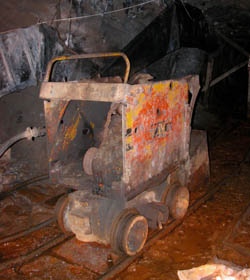Historically, most hot wars were partly motivated by grabs for land and resources, as with colonial wars and World War II. For example, early in the 20th century Japan aspired to industrial power status, but lacked the natural resources for it and was shut out of Asian markets. It thought that its only recourse was to dominate Asia politically and annex it in a Co-Prosperity Sphere. Eventually that strategy led to Pearl Harbor.
In recent decades, the world economy has become more interdependent. Resource wars have become more like cold war; if a tad lukewarm at times. Literally bombing another industrial area is like bombing your own suppliers. So when resources limit growth, wars are more likely to be fought by diplomatic spats, hostile takeovers, cyberwar, and PR. As resources become tighter, we can expect endless flaps unless we learn how to control their usage much better.
Rare Earths: The recent spat between China and Japan finally lifted the Chinese monopoly on rare earths into American newscasts. Apart from political leverage games, most observers think that Chinese rare earth capacity, and perhaps reserves, cannot keep up with increasing global demand. If supply can’t keep up with demand, a way must be soon be found to allocate global rare earth supplies. Longer term, we need to figure out how to recover rare earths that are already in the gismos we use.
Potassium: Both the Chinese and BHP Billiton have bid to take over PotashCorp of Saskatchewan, which sits on about half the global reserves of potash (source of potassium), a major component of fertilizer. The Chinese need to boost crop yields, but have little potash. Australia (home of BHP Billiton) has practically none. Because crop yields need to increase, suitors of PotashCorp are counting on years of high prices and high global demand, which probably means an uptick in food prices.
Phosphorous: In early 2010, Australian researchers projected that global phosphate production could peak in 30-40 years. Australian reserves can hardly supply their own needs. China, the United States, and Morocco, the major producers, have the big reserves. As with other peak projections, controversy between industry boosters and industry critics centers on the quality and size of reserve ores, whether they define peak as “we’re out” or as “the cheap stuff will be gone,” and the consequences of mining less and less concentrated ores.
Life itself has no substitutes for potassium and phosphorus. Neither does industrial agriculture. Before industrial fertilizer, these elements were replenished in soil with manure, bones, compost; even urine – natural recycling. Industrial agriculture boosts yields with extra amounts of these, but excess usage runs off to pollute downstream water (algae and eutrophic “dead zones”). Phosphates have also been used in cleaning agents and many other applications. They have been eliminated from many formulations, but use of phosphates in agriculture is a more wicked problem, far from resolution.

